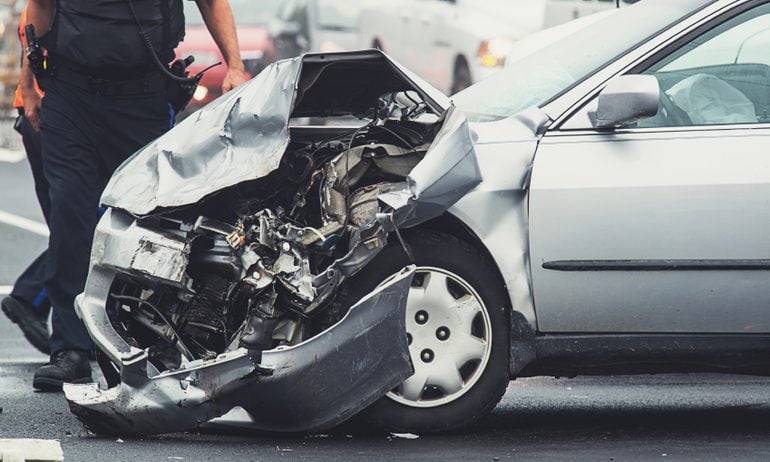How to Know When to File a Car Insurance Claim
You should always file a car insurance claim if you damaged someone else’s property or caused physical harm.

Many, or all, of the products featured on this page are from our advertising partners who compensate us when you take certain actions on our website or click to take an action on their website. However, this does not influence our evaluations. Our opinions are our own. Here is a list of our partners and here's how we make money.
Causing a minor accident can be an embarrassing experience — and then there’s the likelihood of your car insurance rate going up afterward. Because of that, you might be tempted to keep the accident a secret from your insurance company and pay for the repairs out of pocket.
In some cases, that can be a smart decision, like if your car was the only one involved. But if you damaged someone else’s property or injured someone, you could be on the hook for thousands of dollars. In those situations, the safest choice is to file an insurance claim.
See what you could save on car insurance
Easily compare personalized rates to see how much switching car insurance could save you.
When to file a car insurance claim after an accident
Here are some example scenarios of when to file a car insurance claim after an accident, and also a few situations where it may be better to cover it yourself.
Problem | Should you file a claim? |
|---|---|
You put a dent in someone's car and they suggest settling it privately with cash. | Yes, file a claim. Don't make a private deal in case the other driver demands more money later. Suggest they file a claim, then tell your insurer about the accident. |
You cause serious damage to someone else’s vehicle, home or property. | Yes, file a claim. Tell your insurer about the accident because the damage might be more costly than you realize at first glance. |
You cause a car accident with injuries. | Yes, file a claim. Always tell your insurer if anyone is injured. Injuries can easily lead to huge medical bills (up to hundreds of thousands of dollars). |
You accidentally cause minimal damage to your own car, like backing into a pole or mailbox. | No, don't bother contacting your insurer if you don’t have collision coverage or if the damage is less than your collision deductible. There would be no claim payment in that case, so you would have filed a claim and still have to cover the repair costs out of pocket. |
You accidentally cause a lot of damage to your own car. | You may choose to contact your insurer if you want to make a claim on collision coverage, but remember that your rates could go up at renewal time because of the claim. If you don't have collision coverage, there's no reason to contact your insurer because you will have to pay for the repairs anyway. |
File an insurance claim if other drivers are involved
Let’s say you dent someone else’s car in a grocery store parking lot. Settling things with the other driver without getting insurance companies involved may seem like the easiest solution, but that can be risky. After all, you don’t really know who you’re dealing with. What if you pay for repairs, and six months later the other driver comes back demanding more money?
Liability coverage pays for the damage and injuries you cause others, and it may also pay your legal defense costs if you’re sued as a result of an accident. To prepare for a possible claim, you should provide the other driver with your insurance information, call the police and then report the incident to your insurance company.
Depending on where you live, police officers may not come to the scene of the accident if no one is injured and the damage is minor. In that case, file a report at the police station. A police report provides important documentation about the accident, and your insurance company may ask for a copy of that report if you file a car insurance claim.
Always file a claim if there’s serious property damage or potential injuries
Even if the other driver is honest and the accident was only a fender bender, the damage might be more serious than it appears. Additionally, a car might have hidden damage that won’t be found until it’s been looked at by a mechanic.
The average property damage claim in 2023 was $6,551, according to the Insurance Information Institute. While that amount is well below the coverage limits of most policies, it might also be more than you’d be able to pay out of pocket. And if it’s hard to judge the cost of a car repair, it can be even harder to tell whether injuries are involved at the scene of an accident.
Some injuries, such as whiplash, have delayed symptoms that might not show up right away. You definitely don’t want to be held responsible for paying someone else’s medical bills — the average bodily injury liability claim in 2023 was $26,501, according to the Insurance Information Institute, and there’s always a chance that medical bills could reach $100,000 or more.
See what you could save on car insurance
Easily compare personalized rates to see how much switching car insurance could save you.
How long do you have to file an insurance claim after an accident?
NerdWallet recommends filing a car insurance claim as soon as possible. Your policy may require you to notify your insurance company within a reasonable amount of time after the accident, and some states require insurance claims to be filed within a certain time frame.
Waiting too long could jeopardize a claim payment or even make it impossible to receive any payment at all, depending on the laws in your state.
Take photos of the damage to both cars. Photos serve as proof of what damage was caused from the accident. This could protect you if the other driver claims additional damage afterward in an attempt to get more money.
When to cover an accident out of pocket
In some scenarios it might make sense to avoid filing a claim and simply pay for your own repairs. For example, you may decide to cover the costs yourself if:
Your insurance policy only includes liability coverage. If you don’t have collision coverage, your policy won’t cover damage to your car and you’d have to pay for repairs anyway.
The damage is minimal. Collision coverage will pay for damage to your car, minus your deductible. But if you dented your bumper by backing into a mailbox, you may prefer to pay for the repairs yourself or just leave the dent rather than filing a claim.
If you’re not sure whether the damage is worth covering yourself, get a quick repair estimate. There’s no point filing a claim for repairs that cost less than your collision coverage deductible — the amount you pay out of pocket toward a repair.
Even if the repair costs are more than your deductible, you may still decide to cover the repairs yourself, since filing an auto insurance claim could lead to paying a higher insurance rate in the future. Whether your rates will go up after a claim depends on your previous claims history, your insurance company and even your state, which may have rules about when or if insurers can increase rates.
Surcharges — insurance industry lingo for insurance premium increases — typically last about three years, and they may gradually decrease over that period. Check your insurer’s website to see how long an accident will affect the cost of your insurance.
If the cost of your insurance does increase after an accident, you should compare car insurance rates before your next policy renewal. You can use NerdWallet’s car insurance comparison tool to see if you’re getting the best price for your current policy or if there are better options available.
» MORE: Compare car insurance rates





